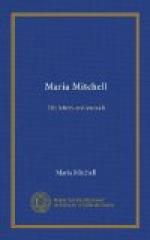“In her general sympathy for suffering humanity, Miss Dix seems neglectful of the individual interest. She has no family connection but a brother, has never had sisters, and she seemed to take little interest in the persons whom she met. I was surprised at her feeling any desire to see me. She is not strikingly interesting in conversation, because she is so grave, so cold, and so quiet. I asked her if she did not become at times weary and discouraged; and she said, wearied, but not discouraged, for she had met with nothing but success. There is evidently a strong will which carries all before it, not like the sweep of the hurricane, but like the slow, steady, and powerful march of the molten lava.
“It is sad to see a woman sacrificing the ties of the affections even to do good. I have no doubt Miss Dix does much good, but a woman needs a home and the love of other women at least, if she lives without that of man.”
The following entry was made many years after:—
“August, 1871. I have just seen Miss Dix again, having met her only once for a few minutes in all the eighteen years. She listened to a story of mine about some girls in need, and then astonished me by an offer she made me.”
“Feb. 15, 1853. I think Dr. Hall [in his ‘Life of Mary Ware’] does wrong when he attempts to encourage the use of the needle. It seems to me that the needle is the chain of woman, and has fettered her more than the laws of the country.
“Once emancipate her from the ’stitch, stitch, stitch,” the industry of which would be commendable if it served any purpose except the gratification of her vanity, and she would have time for studies which would engross as the needle never can. I would as soon put a girl alone into a closet to meditate as give her only the society of her needle. The art of sewing, so far as men learn it, is well enough; that is, to enable a person to take the stitches, and, if necessary, to make her own garments in a strong manner; but the dressmaker should no more be a universal character than the carpenter. Suppose every man should feel it is his duty to do his own mechanical work of all kinds, would society be benefited? would the work be well done? Yet a woman is expected to know how to do all kinds of sewing, all kinds of cooking, all kinds of any woman’s work, and the consequence is that life is passed in learning these only, while the universe of truth beyond remains unentered.
“May 11, 1853. I could not help thinking of Esther [a much-loved cousin who had recently died] a few evenings since when I was observing. A meteor flashed upon me suddenly, very bright, very short-lived; it seemed to me that it was sent for me especially, for it greeted me almost the first instant I looked up, and was gone in a second,—it was as fleeting and as beautiful as the smile upon Esther’s face the last time I saw her. I thought when I talked with her about death that, though she could not come to me visibly, she might be able to influence my feelings; but it cannot be, for my faith has been weaker than ever since she died, and my fears have been greater.”




